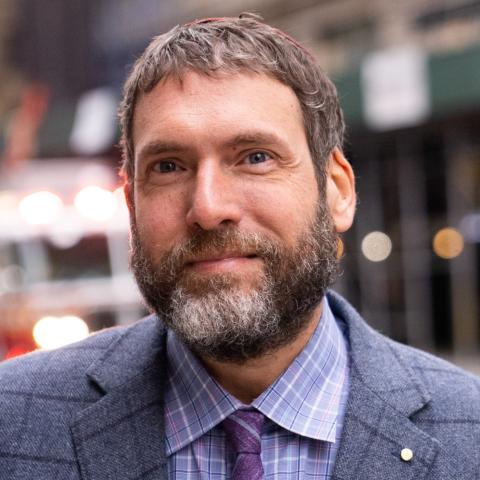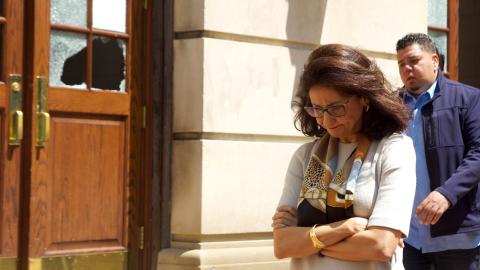Earlier this week, Minouche Shafik, Columbia University’s president, unexpectedly resigned her post. You would think that the departure of an Ivy League leader less than three weeks before the start of the fall semester would be a cataclysmic event, an indication that the institution and its board are ready to account for the series of unfortunate events that led the august school to this low point, a string of catastrophes that began with a temperate embrace of the anti-Semitic marauders who occupied the campus and harassed their Jewish classmates and ended with the shameful resignation of three deans who were caught exchanging text messages disparaging Jewish students concerned about said harassment. You’d expect something close to soul-searching, something approximating an apology, something approaching a promise to do better when thugs brandish the Hamas flag and threaten Jewish students that they’re next on the terror group’s kill list.
Welcome to American academia: what we got instead this week were two statements, one from Shafik and one from her interim replacement, Katrina Armstrong, that are so dazzling in their moral, intellectual, and emotional vacuity that they deserve to be read closely and carefully. Call these twin missives the ur-texts of our academic Armageddon, proof that from the crooked timber of contemporary American higher education no straight thing may ever be built again.
First, Shafik’s resignation. Here is its first paragraph, in full:
“I write with sadness to tell you that I am stepping down as president of Columbia University effective August 14, 2024. I have had the honor and privilege to lead this incredible institution, and I believe that—working together—we have made progress in a number of important areas. However, it has also been a period of turmoil where it has been difficult to overcome divergent views across our community. This period has taken a considerable toll on my family, as it has for others in our community. Over the summer, I have been able to reflect and have decided that my moving on at this point would best enable Columbia to traverse the challenges ahead. I am making this announcement now so that new leadership can be in place before the new term begins.”
Sadness? Appropriate. Progress in a number of important areas? No evidence is provided, but let us, in the spirit of human kindness, nod right along. But then we get to the heart of the matter: “a period of turmoil where it has been difficult to overcome divergent views across our community.” What, pray tell, ushered in this period of turmoil? Shafik’s statement doesn’t say, making it seem as if the turmoil and everything that followed emanated from the period itself: it was the dawn of the Age of Aquarius, Mercury was in retrograde, and the Earth was suddenly awash in cosmic duress. Having hardly recovered from such deadening vagueness, we are finally treated to a bit of thick description: the turmoil, Madam President informs us, arose because we found it “difficult to overcome divergent views across our community.”
This last bit is, technically speaking, entirely true. The anti-Semites on Columbia’s campus called for the destruction of the world’s only Jewish state, cheered for the beheaders of babies and the rapists of women and girls, smacked Jews over the head, barred them from moving around campus freely, and violently took over one of the university’s buildings, holding an employee hostage. And the Jewish students, having apparently no respect for the spirit of academic freedom, refused to compromise and meet halfway those who wished them dead. No wonder no divergent views were overcome. And shame on those hard-hearted Jews for inflicting such difficulties not only on the noble-minded Minouche Shafik but also on her family.
The rest of the statement is just as silly. Shafik waxes poetic about how she and the university have “zero tolerance for discrimination of any kind—including gender, race, religion, sexual orientation, national origin, or ethnicity,” neglecting to mention the fact, previously documented in these pages, that she and her team spent a grand total of six days investigating the outburst of hate on campus, arriving at no conclusions, finding no guilty parties, and taking no steps to prevent such petit pogroms from recurring.
Have mercy, you might say—the woman stepped down, right? Let her have her dignified exit without opening every wound and confessing to every sin. That might have been possible, had her successor then picked up the soiled mantle of decency and honesty and delivered a message that reassured everyone that serious adults were once again at Columbia’s helm.
Ladies and gentlemen, I give you Katrina Armstrong: “As I step into this role,” she wrote in her inaugural message, “I am acutely aware of the trials the University has faced over the past year. We should neither understate their significance, nor allow them to define who we are and what we will become.”
Huh? It hardly takes a Ph.D. in moral philosophy to understand that students holding a custodian hostage while demanding that the university supply them with birth control and vegan food—no bagels!—absolutely defines what the university has become. The rest of Armstrong’s statement strongly suggests that there wasn’t much learning going on over the summer at Columbia: “The familiar excitement and promise of a new academic year are informed this year by the presence of change and continuing concerns,” Armstrong continues, “but also by the immense opportunity to look forward, to join together for the laudable mission we are here to serve, and to become our best selves individually and institutionally.” Not once does she mention anti-Semitism by name, describe the nature of the trials the university has faced, or, at the very least, make a promise that she will conform with U.S. law and take steps against foreign students on campus expressing explicit support for terrorist groups, an offense punishable by deportation. That, in Morningside Heights, is a bridge too far.
These twin statements, Armstrong’s and Shafik’s, tell the story of Columbia’s decline better than any in-depth analysis ever could. They prove yet again that our elite academic institutions have become swamps of ideological inflammation and corporate-sponsored obtuseness, an environment ill-suited to the pursuit of ideas. Shafik is out, Armstrong is in, and nothing has changed or will change at Columbia University. To fix this festering problem, we’ll need stronger medicine and tough-minded outsiders—from donors to lawmakers—not afraid to roll up their sleeves.
Enjoyed this interview? Subscribe to Hudson’s newsletters to stay up to date with our latest content.

















